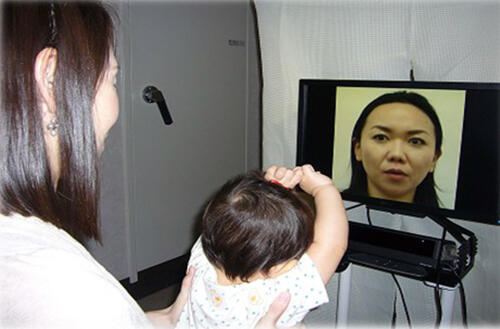A cultural and linguistic difference between Japanese people and native English speakers is that the former watches the eyes of the speaker, while the latter watches the mouth. A research group, including Professor Kaoru Sekiyama from the Graduate School of Advanced Integrated Studies in Human Survivability at Kyoto University, Researcher Satoko Hisanaga from the Faculty of Letters at Kumamoto University, and Associate Professor Ryoko Mugitani from the Faculty of Humanities and Social Sciences at Nihon Women's University, measured the gaze of infants in Japan and discovered that this difference, which has been reported in adults, exists from early childhood.
When we hear people talk, we also use visual information from their face, such as the movements of the speaker's mouth. Professor Sekiyama commented that "Several research methods have been used to examine cultural and linguistic differences and it has been suggested that Japanese people do not use the information of mouth movements as much as native English speakers do but are relatively more reliant on hearing. There have also been reports that this tendency exists since early childhood before language ability develops." The research participants included 120 Japanese infants (aged six months to three years), and 12 young adults, who watched videos of female speakers speaking short phrases of about ten seconds and measured the participants' gaze by examining what part of the speaker's face was focused on the most.

Credit: Kyoto University
The researchers compared the proportion of time spent looking at the mouth with that spent looking at the face and examined whether the kind of developmental change reported in Europe and North America can also be seen among Japanese infants. As another point of consideration, parents were asked to teach their children spoken words using a vocabulary list to investigate whether the rate of attention to the mouth relates to vocabulary development. They also examined whether attention to the mouth increases when there is noise that makes it difficult to hear the parents' voice, as reported for adults.
The results demonstrate that Japanese infants divide their attention equally between the eyes and mouth at the ages whereas the gaze focuses on the mouth in the English-speaking world. Additionally, for children aged two years or above, vocabulary was more developed among children who watch the eyes, which is a tendency that has not been reported in the English-speaking world. Professor Sekiyama said that "In the future, we want to compare not only Japanese infants but also infants in English-speaking countries under the same conditions to be able to draw even stronger conclusions about cultural and linguistic differences."
This article has been translated by JST with permission from The Science News Ltd.(https://sci-news.co.jp/). Unauthorized reproduction of the article and photographs is prohibited.




